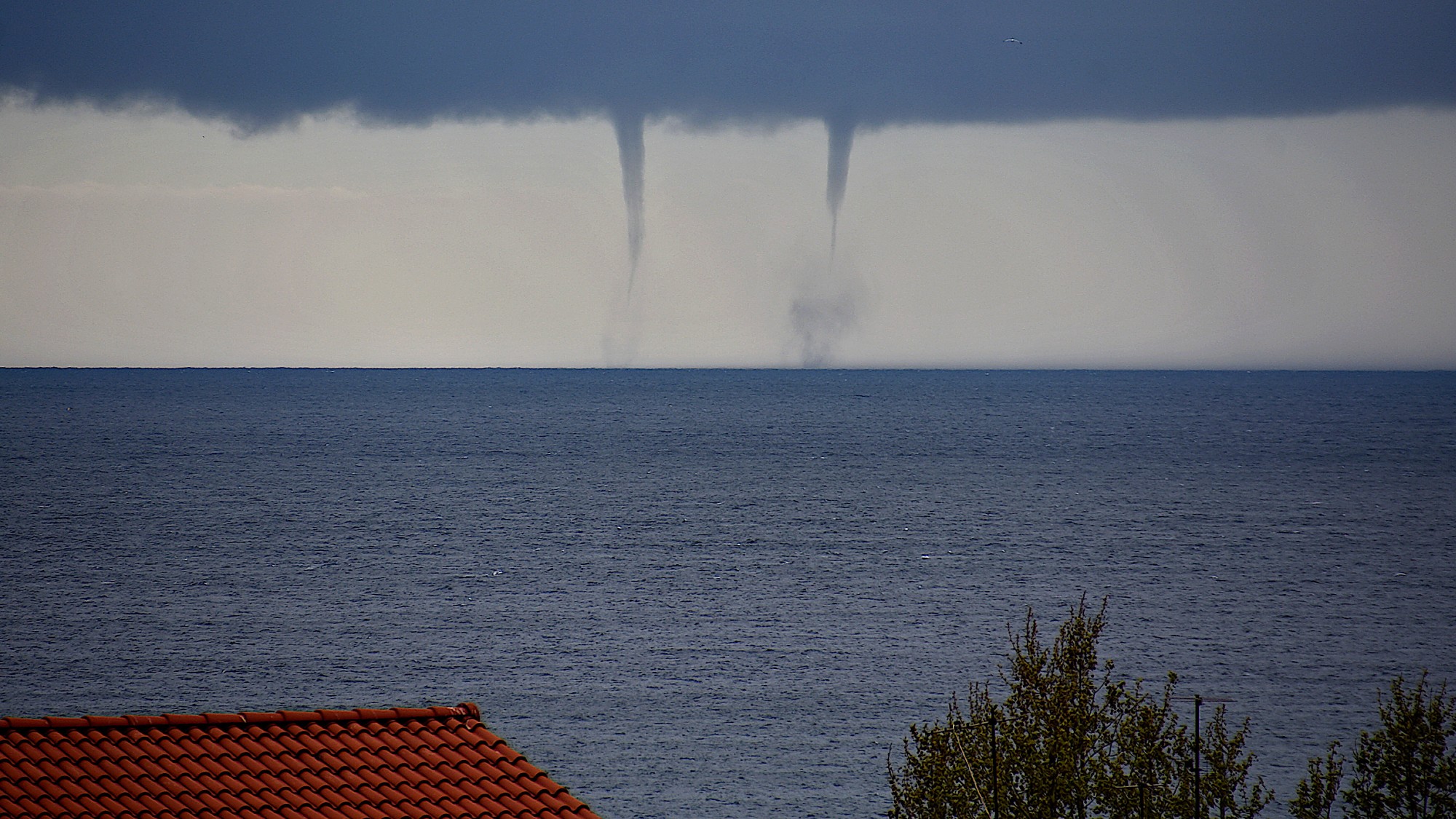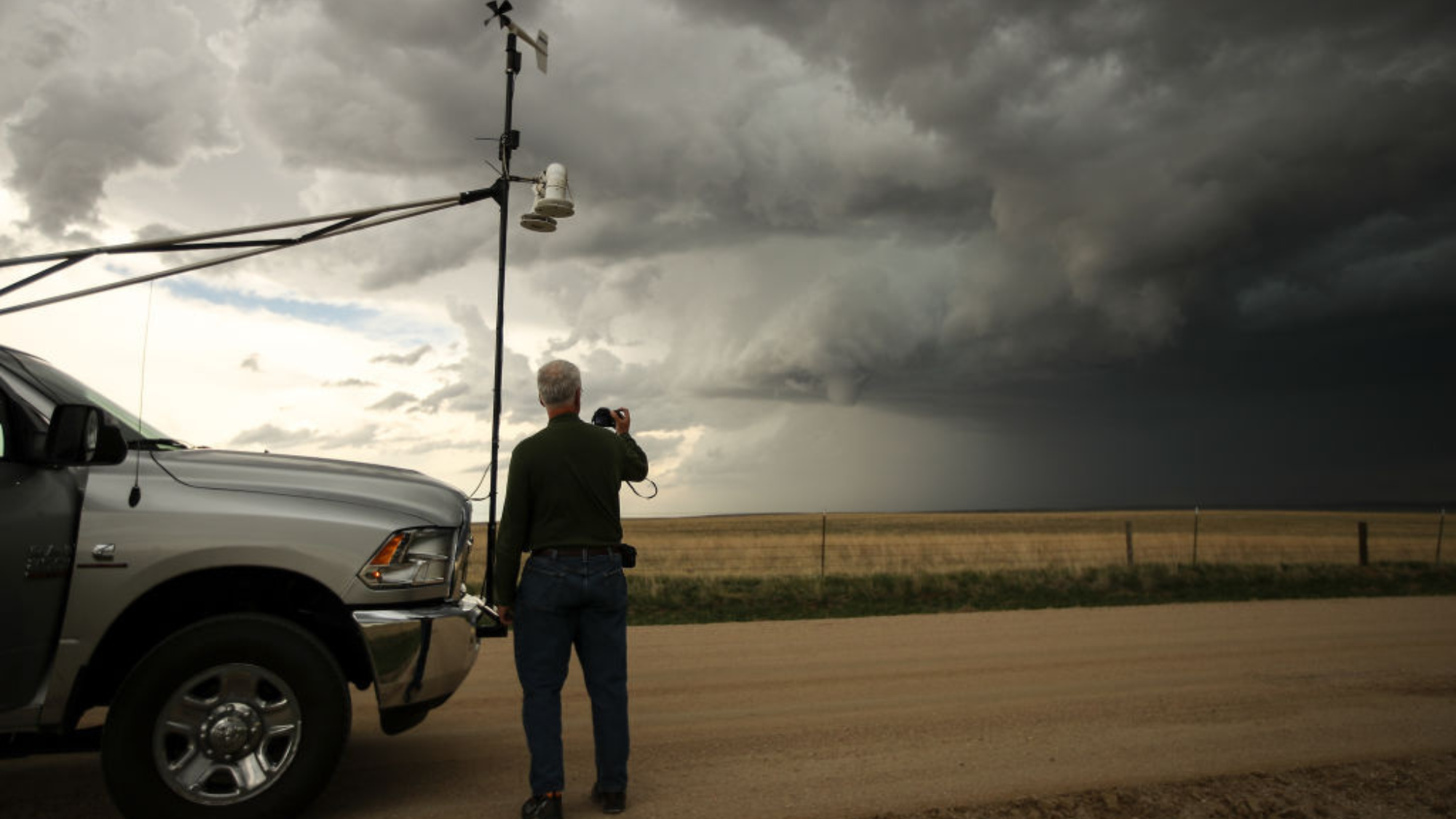Waterspouts: the water tornado thought to have caused Sicily tragedy
Rare phenomenon thought to have caused the death of six people including British businessman Mike Lynch

A free daily email with the biggest news stories of the day – and the best features from TheWeek.com
You are now subscribed
Your newsletter sign-up was successful
A "black swan" weather event is believed to be the cause of a luxury yacht's sinking off the coast of Sicily. The British-flagged yacht, Bayesian, was likely brought down within minutes by a rare phenomenon known as a waterspout.
Such weather events are "characterised by their extreme rarity and severe impact", and are dubbed 'black swan' events because they are "considered unpredictable and beyond normal expectations", said The Times.
The 56-metre sailboat sank in the early hours of Monday morning. Fifteen of the 22 people who were on board the luxury yacht at the time were rescued. Six bodies have now been brought to shore, including British businessman Mick Lynch, while the one person who is still missing is Lynch’s 18-year-old daughter, Hannah.
The Week
Escape your echo chamber. Get the facts behind the news, plus analysis from multiple perspectives.

Sign up for The Week's Free Newsletters
From our morning news briefing to a weekly Good News Newsletter, get the best of The Week delivered directly to your inbox.
From our morning news briefing to a weekly Good News Newsletter, get the best of The Week delivered directly to your inbox.
The boat was anchored just offshore close to Porticello when it was apparently struck by a waterspout.
The exact cause of the Bayesian's sinking remains unclear, but it occurred during a storm in which "witnesses have described seeing a waterspout form" shortly before the yacht went down, according to the BBC.
What is a waterspout?
Waterspouts are "a whirling column of air and water mist" according to the US National Ocean Service. They fall into two categories: fair-weather waterspouts and tornadic waterspouts.
Tornadic waterspouts, which form during thunderstorms, can either develop over water or move from land to water. These waterspouts "share the same characteristics as a land tornado", said the NOS. This type of weather phenomenon is typically "associated with severe thunderstorms" and is often accompanied by "high winds and seas, large hail, and frequent dangerous lightning". In contrast, fair-weather waterspouts usually form under the dark, flat base of a line of developing cumulus clouds.
A free daily email with the biggest news stories of the day – and the best features from TheWeek.com
The waterspout that likely struck the Bayesian is believed to have been a tornadic waterspout, triggered by one of the many storms that have swept through Italy in recent days. These storms have caused widespread damage, with floods and landslides devastating northern Italy after weeks of "scorching" heat, said The Guardian.
How common are they?
Like tornadoes, most waterspouts are "only short-lived, narrow columns" which are "not easily picked out on weather radars", meaning many go unreported, said the BBC. But "they are not as rare as you may think".
The International Centre for Waterspout Research reported 18 confirmed waterspouts off the coast of Italy on August 19th alone.
In the northern hemisphere, "waterspouts are most common in late summer and through the autumn, when sea temperatures are at their highest, fuelling the storm clouds". And as sea temperatures rise due to climate change, "there is a concern that they could become more common", said the broadcaster.
However, although the number of reported waterspouts in the Mediterranean has increased in recent decades, "researchers believe this is in large part because of better surveillance" rather than a marked increase in their occurrence, said The Economist.
Could a waterspout have sunk the Bayesian?
Tornadic waterspouts "can be very dangerous" said The Economist, but even if one was responsible for sinking the luxury yacht, it would be "highly unusual".
While witnesses at the scene said the wind appeared to push the yacht's mast flat against the water — the Bayesian's was among the tallest aluminium masts in the world — such vessels are "designed such that they should not sink even if their mast goes under water; their keel should provide a counter-weight that would right the boat".
It suggests that there may have been "other problems" such as portholes and hatches left open at anchor due to the heat, allowing water to flood into the interior of the boat.
The Bayesian also had a retracting keel, which, if raised during the storm, "would have lessened the leverage exerted against the force of the wind on the hull, mast and rigging". The updraft from a tornadic waterspout could have created "an equally fearsome downdraft", potentially "pinning the boat in its capsized position and allowing water to flood in", said the paper.
Prosecutors in the town of Termini Imerese, close to Porticello, have opened an investigation into the disaster.
They will seek to establish what caused the yacht to sink and whether any of the crew are criminally liable.
Sorcha Bradley is a writer at The Week and a regular on “The Week Unwrapped” podcast. She worked at The Week magazine for a year and a half before taking up her current role with the digital team, where she mostly covers UK current affairs and politics. Before joining The Week, Sorcha worked at slow-news start-up Tortoise Media. She has also written for Sky News, The Sunday Times, the London Evening Standard and Grazia magazine, among other publications. She has a master’s in newspaper journalism from City, University of London, where she specialised in political journalism.
-
 How the FCC’s ‘equal time’ rule works
How the FCC’s ‘equal time’ rule worksIn the Spotlight The law is at the heart of the Colbert-CBS conflict
-
 What is the endgame in the DHS shutdown?
What is the endgame in the DHS shutdown?Today’s Big Question Democrats want to rein in ICE’s immigration crackdown
-
 ‘Poor time management isn’t just an inconvenience’
‘Poor time management isn’t just an inconvenience’Instant Opinion Opinion, comment and editorials of the day
-
 Parthenogenesis: the miracle of 'virgin births' in the animal kingdom
Parthenogenesis: the miracle of 'virgin births' in the animal kingdomThe Explainer Asexual reproduction, in which females reproduce without males by cloning themselves, has been documented in multiple species
-
 Twisters: the real-life science behind storm chasers
Twisters: the real-life science behind storm chasersIn the Spotlight Scientists race against time to gather data on 'meteorological mystery'
-
 This year's solar storms will help future Mars astronauts
This year's solar storms will help future Mars astronautsThe explainer Getting to the Red Planet requires planning and a whole lot of knowledge
-
 Why does the US fertility rate keep dropping?
Why does the US fertility rate keep dropping?The explainer Women are less eager to have children
-
 Citizen science says anyone can be a scientist
Citizen science says anyone can be a scientistThe explainer Yes, even you. The practice is being increasingly accepted by researchers as a way to gather data.
-
 The moon, it's shrinking!
The moon, it's shrinking!The Explainer Landing on the moon is soon going to be harder than previously thought
-
 The first moon lander launch in decades almost didn't happen
The first moon lander launch in decades almost didn't happenThe Explainer 5, 4, 3, 2 … drama
-
 Asian hornets threaten ‘catastrophe’ for UK bees
Asian hornets threaten ‘catastrophe’ for UK beesSpeed Read Invasive species is gaining ‘foothold’ in southern England with ‘sharp rise’ in sightings